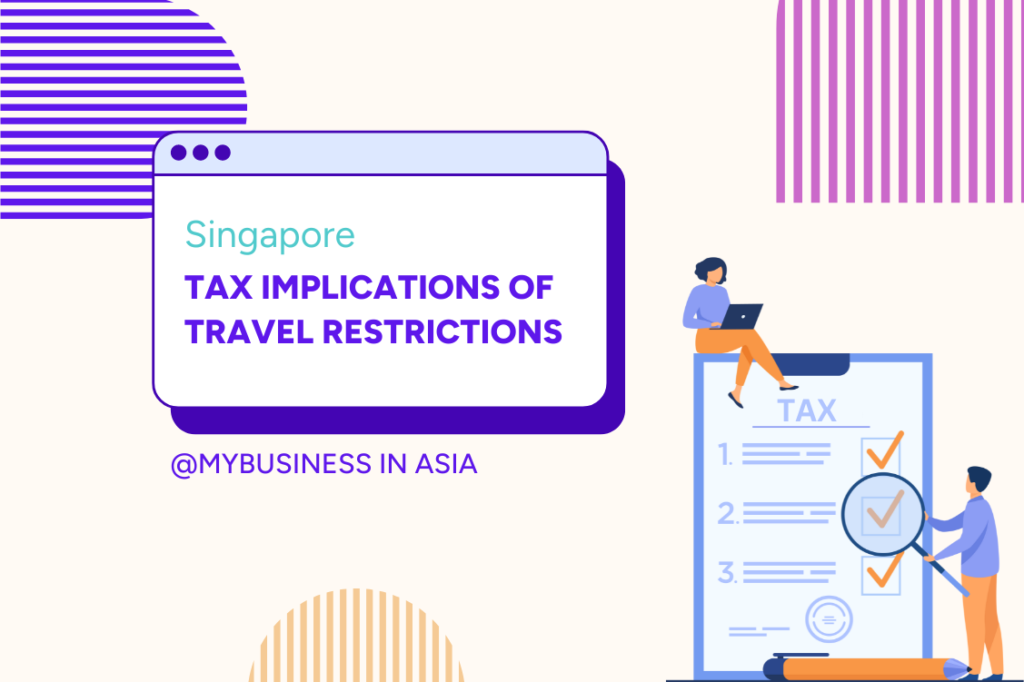
Since the beginning of the COVID-19 pandemic, governments around the world have sought to implement a series of extraordinary measures, such as travel restrictions and lockdowns. In record time, the world has deployed aid plans to try to mitigate the economic impacts.
On the other hand, individuals and companies have also had to adapt to this new way of life. For companies, it has become timely to take into consideration the other issues of COVID-19, especially tax issues.

The OECD, in its recommendations of 3rd of April 2020, warned of the problems of applying international tax rules, in particular the problems of ascertaining tax residence. Thus, for individuals who are stranded in a country because of their work, the difficulty of determining their tax residence will have an impact on tax rules.
“This unprecedented situation is raising many tax issues, especially where there are cross-border elements in the equation; for example, cross-border workers, or individuals who are stranded in a country that is not their country of residence. These issues have an impact on the right to tax between countries, which is currently governed by international tax treaty rules that delineate taxing rights.”
In Singapore, the Institute of Singapore Chartered Tax Professionals contacted the Inland Revenue Authority of Singapore (‘IRAS‘) early April, to highlight tax issues. The IRAS responded by focusing on three key tax issues and provided rules of interpretation.
In this article, we will cover key ideas:
- Tax residency of companies
- Permanent establishment
- Personal taxation – Tax residence and related issues
- Conclusion
Tax residency of companies
The tax residence status of a company is, as a general rule of thumb, determined by the place where its strategic decisions are taken. Lockdowns and travel restrictions have made it difficult for key executives and directors to attend their board meetings in person. As a result, the determination of where strategic decisions are made has become difficult to assess.
In Singapore, a company is resident for Singapore tax purposes if its control and management are exercised from Singapore. In other words, if the meetings of the board of directors are held in Singapore.
Under the current situation, a company could face uncertainty as to its tax residency status if its control and management are considered to be exercised outside of Singapore due to travel difficulties. In such a case, it could be questioned whether the company will still be considered a tax resident in Singapore or whether this will result in other tax implications, such as loss of access to tax treaty benefits.
In response to this situation, IRAS has come to support Singapore companies and allows them to still be considered tax residents for the year 2020. This applies even if the company is unable to hold its boards of directors in Singapore. However, IRAS sets conditions for this measure to apply, the company must :
- be resident for tax purposes in Singapore for the year 2019,
- have no other major changes in its economic circumstances, and
- be able to justify that mobility restrictions are the main reason for holding board meetings outside Singapore or by electronic means.
Conversely, a company that is not tax resident in Singapore during the year 2020 but holds its board meetings in Singapore due to travel restrictions, will continue to be considered as non-resident if there are no major changes in its economic situation during the year 2020. Each countries or jurisdictions may have a different interpretation of the OECD recommendations and tax residency rules, so multinational enterprises are advised to keep an eye on regulatory developments in countries where their directors or key executives are temporarily located because of travel restrictions in place.
Permanent establishment
The concept of permanent establishment is used to determine the right of a jurisdiction to tax the profits of a foreign company.
In Singapore, if a foreign company has a permanent establishment and has revenue earned and/or derived from Singapore or from foreign sources received in Singapore, part or all of the company’s revenues will in principle be taxed in Singapore.
A permanent establishment generally refers to a fixed place of establishment in another country through which the business of a company is carried on in whole or in part, even without registration or filing. Under tax treaties, certain activities conducted in a jurisdiction may qualify as a permanent establishment. For example, services provided by a company through its employees or an agent who has, and usually exercises, general authority to negotiate and execute contracts on behalf of the company.
IRAS clarified whether the presence of an employee stranded and working in Singapore because of COVID-19 constitutes a permanent establishment in Singapore.
- The foreign company must not have had a permanent establishment in Singapore for the year 2019;
- The activities carried out by the employees during the unforeseen presence would not have been performed in Singapore without the travel restrictions.
Personal taxation – Tax residence and related issues
In Singapore, an individual will generally be treated as a tax resident if:
- He is a Singaporean citizen; or
- He is a permanent resident of Singapore; or
- He is a foreigner but has stayed or worked in Singapore for at least 183 days in the previous tax year.
Other criteria may apply depending on the situation. A non-resident staying less than 60 days a year in Singapore will not be taxed on his income in Singapore.
However, the current situation can result in a foreigner being stranded in Singapore and working there for more than 60 days. In this case, IRAS also came to clarify the situation.
Indeed, a non-resident foreigner normally employed abroad but working remotely from Singapore for his employer abroad due to mobility restrictions, will be treated as not working in Singapore for the duration of his extended stay if two conditions are met :
- The period of extended stay must not exceed 60 days; and
- Work during this period would have been performed abroad without COVID-19.
A citizen or permanent resident of Singapore who normally works overseas but works remotely from Singapore will still be considered to be working outside Singapore until September 30, 2020, provided that the provisions of his or her employment contract signed for his or her overseas employment remain unchanged and that the working arrangement in question is made because of COVID-19.
Additional considerations:
- For fringe benefits distributed to employees as a result of the COVID-19 situation (e.g. cash benefits). There is currently no special tax treatment for these benefits; the existing tax treatment applies.
- Persons under the NOR regime who are unable to spend at least 90 days outside Singapore for work-related reasons will not be able to benefit from the time-sharing arrangement, even if the non-compliance is due to travel restrictions.
Conclusion
A new era comes with new standards.
If remote working becomes the new norm, then tax concepts as we know them will have to be adapted to remain relevant. The location of the board of directors’ meeting may eventually no longer be a factor determining a company’s tax residence.
Other issues were not discussed in this article, such as property taxes and GST, could have an impact on businesses. It is important for companies to keep track of tax changes and measures taken in each country while the effects of the pandemic are being felt.


